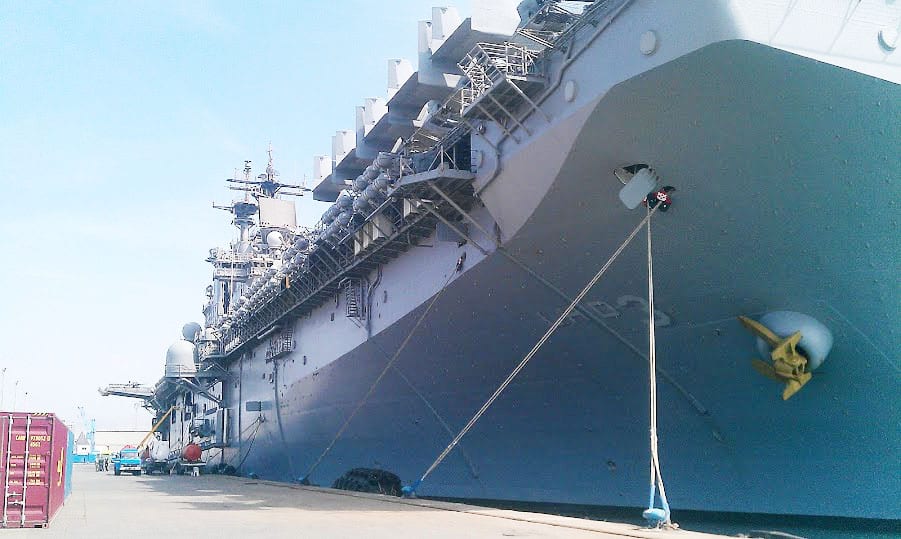As foreign minister, Nikos Christodoulides put at risk the lifting of the US arms embargo with a ‘humanitarian’ accord that would have allowed Russian military vessels to dock at Cypriot ports
An agreement on cooperation with the Russian Federation for humanitarian operations, signed four months before the invasion of Ukraine would have threatened the lifting of the US arms embargo on Cyprus, diplomatic sources have told the Sunday Mail.
This is because the agreement on ‘Cooperation during Humanitarian Operations Performed in Case of Crisis Management Situations,’ signed in October 2021 in Moscow by foreign minister at the time, Nikos Christodoulides, offered Cyprus ports for the docking of Russian warships and airports “for landing military aircraft.”
The agreement violated one of the provisions of the Menendez-Rubio, ‘Eastern Mediterranean Security and Energy Partnership Act of 2019’, which ultimately opened the way for the lifting of the US arms embargo on Cyprus last September.
One of the provisions of the Act is to “urge countries in the region to deny port services to Russian vessels deployed to support the government of Bashar Al-Assad and terminate existing agreements granting Russian naval vessels access to ports.”
Two years later, and before the lifting of the US arms embargo in September 2022, Christodoulides went to Moscow, where he met foreign minister Sergei Lavrov and signed the cooperation agreement for humanitarian crises, which provides all the facilities demanded by Russia in Cyprus.
The agreement would have allowed Russia to use Cyprus’ “territory and infrastructure including ports and airports,” for “warships or a warship unit and for military aircraft.” The personnel of the “sending state that are in the territory of the receiving state for the purpose of the implementation of the agreement shall enjoy freedom of movement to the extent agreed by the bodies of the authorised bodies of the parties,” it said.
“This is more like an agreement on military rather than humanitarian cooperation, as it offers the use of facilities in Cyprus to the Russian navy and air force, as well as military personnel, on the pretext of humanitarian operations,” said a diplomatic source.
The agreement also had provisions for the storage of dangerous cargo. “In the case of need for special conditions for safe storage of dangerous goods transferred by the sending state to the territory of the receiving state, the relevant information shall be submitted at least 72 hours before scheduled arrival.” This begs the question: why would dangerous good be transferred to Cyprus during a humanitarian operation?
Ratification of the agreement, which would last five years, did not ultimately materialise because the internal procedures had to be finalised for it to come into force, something that has not happened. This is because of the change of foreign minister, Ioannis Kasoulides, who replaced Christodoulides at the beginning of last year, being much more Western-oriented than his predecessor, who enjoyed close ties with Lavrov and Moscow.
This change was evident immediately. It was Kasoulides’ initiative to stop the docking of all Russian ships in Cyprus ports, from March 1 of last year, immediately after the invasion of Ukraine. The EU decision to ban Russian ships came in April.
“The signing of the agreement shows the intention of Christodoulides to institutionalise the cooperation,” said the diplomatic source. “Moscow’s demands were satisfied, regardless of this affecting our relations with the US by contravening the conditions for the lifting of the arms embargo,” he also said.
Had Kasoulides not taken over the ministry and had the Ukraine invasion not occurred, the Moscow deal would have been a major blow to the lifting of the US arms embargo.
Christodoulides would not, however have signed the agreement without the go-ahead of President Nicos Anastasiades but he could have argued against doing so as Kasoulides had done on previous occasions.
The Russian Federation had been pressing for a military cooperation with the Republic since 2013 when Anastasiades came to power. In August 2013, it invited the then defence minister Fotis Fotiou to Moscow for talks on Cyprus providing military facilities. The military cooperation agreement was scheduled to be signed when Anastasiades visited Moscow in 2015.
Kasoulides, who was also foreign minister during Anastasiades’ first term, prevented this from happening. In the end, as a face-saving solution, a memorandum of military cooperation, instead of an agreement, which would have been legally binding, was signed.
Moscow got what it wanted in 2021 but named it a humanitarian agreement. Peculiarly, the bodies responsible for its implementation would be the Ministry of Foreign Affairs of Cyprus and Russia’s Ministry of Defence as well as the Ministry of Emergencies. Cyprus’ defence ministry was left out, although it had been the signatory of the memorandum of military cooperation.
During the same visit to Moscow, Christodoulides also signed the ‘Strategic Framework of Cooperation’ between the two countries, valid from 2022 to 2024. This was an update of an expired framework, and again provided for the docking of Russian ships in Cyprus ports.
Paragraph 40 states: “The participants will continue the exchange of visits by warships, including visits by ships of the navy of Russian Federation, to ports of the Cyprus Republic, which are open to international shipping,” it says.
The framework also had a provision that was a blatant violation of EU decisions on cyber security. Paragraph 26 states: “The participants intend to cooperate on the issues of the development of technology on the digitalisation of information, social networks and the combating of misinformation, as well as the development of cooperation in the field of securing international security of information.”
Cooperation on digital technology with Russia “is a violation of EU decisions on cyber security, which were taken to deal with hybrid threats from Russia,” said the diplomatic source and added: “This contravenes the commitments we made to the EU, which considers hybrid attacks a big threats.”
The framework was presented to the council of ministers for approval by Christodoulides without any prior consultations with ministries as is the usual practice. Normally, when a framework of cooperation is drafted, ministries are consulted about provisions related to their authority. This did not happen.
While promoting Russia’s interests, Christodoulides, was quick to claim credit for the lifting of the US arms embargo, despite the fact that the two agreements he signed in Moscow in October 2021, flagrantly violate the main condition for its lifting.
This did not stop him taking credit for the lifting of the embargo. When it was announced in September of last year, he said: “The decision, of vital importance, of the American government is the result of efforts made in the last years with the signing of the Statement of Intent between Cyprus and the US on 6 November 2018 in Washington, which was catalytic significance.”
The Statement of Intent on security issues, was the result of the work by Kasoulides who left the ministry a few months before its signing.







Click here to change your cookie preferences